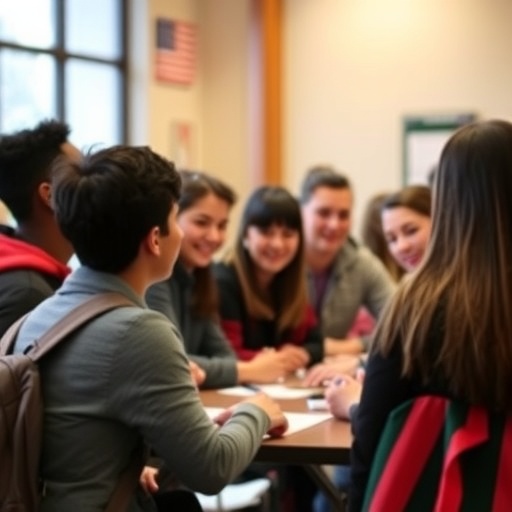Student mini-publics have emerged as a distinctive form of democratic engagement in educational contexts, highlighting the role of deliberative processes in shaping governance structures within higher education. In their forthcoming article, Pek and Kennedy delve into the implications of these mini-publics, which bring students together in a structured environment to discuss critical issues affecting their academic lives and institutional policies. The authors advocate for a comprehensive evaluation of these initiatives, recognizing that their impact extends beyond mere participation, influencing governance, policy formulation, and students’ educational experiences.
The concept of mini-publics refers to small, diverse groups that engage in intensive deliberation on specific topics, aiming to represent the broader community’s views. In higher education settings, these deliberative forums are designed to engage students meaningfully, offering them the opportunity to voice their opinions and contribute to decision-making processes. By fostering a culture of deliberation, educational institutions can become more responsive to the needs and aspirations of their student bodies.
Pek and Kennedy argue that the significance of these mini-publics must be viewed through a broader lens, considering not only the immediate outcomes for participants but also the long-term effects on institutional governance. The authors contend that effective governance requires a feedback loop between students and administrators, where deliberation leads to meaningful changes in policies that govern student life and academics. This reciprocal relationship has the potential to create a more inclusive environment where students feel genuinely invested in their educational institutions.
The article probes into various forms of governance influenced by student mini-publics, particularly focusing on their ability to catalyze institutional change. Through a mixture of qualitative case studies and quantitative assessments, the authors aim to provide a nuanced understanding of the dynamics at play. They explore how these deliberative platforms can empower students, fostering a sense of agency and responsibility that extends beyond the classroom and into the broader academic community.
A critical aspect of the discussion revolves around the design and implementation of mini-publics. Pek and Kennedy emphasize that successful deliberative initiatives must be carefully structured to ensure genuine engagement. This involves selecting diverse participant groups, crafting effective facilitation strategies, and establishing clear objectives that reflect the interests of the student populace. When designed thoughtfully, student mini-publics can break down barriers between students and administration, creating a space where dialogue can flourish.
Moreover, the authors identify the challenges associated with conducting and evaluating these initiatives. They point out that while mini-publics hold considerable promise, their effectiveness can be inhibited by logistical hurdles, such as timing, resource allocation, and institutional resistance to change. Understanding these barriers is crucial. It allows for the strategic planning needed to implement mini-publics that genuinely impact governance structures within higher education.
Pek and Kennedy also address the role of technology in facilitating these deliberative processes. In an increasingly digital world, online platforms can enhance participation by providing flexible opportunities for engagement. However, the authors caution against over-reliance on technology, emphasizing that face-to-face deliberation is crucial for building trust and understanding among participants. They advocate for a blended approach that harnesses the benefits of digital tools while maintaining the core values of direct engagement.
The implications of student mini-publics extend well beyond the walls of individual institutions. The article explores how these initiatives can serve as models for democratizing higher education governance on a larger scale. By showcasing successful case studies where student voices have resulted in tangible changes, Pek and Kennedy illustrate how effectively implemented mini-publics could shape the future of academic governance and elevate the role of students within these systems.
Additionally, Pek and Kennedy recognize the interdisciplinary nature of mini-publics and their potential contributions to the fields of political science, education, and sociology. They argue that the insights gained from studying these deliberative processes can inform broader discussions about democratic engagement and participatory governance practices. As such, understanding the ramifications of student mini-publics may offer valuable lessons applicable to various sectors beyond education.
As the authors look forward, they call for further research into the impact of student mini-publics on institutional cultures. They emphasize the need for longitudinal studies that track not only immediate outcomes but also long-term shifts in governance practices and student engagement. This comprehensive approach can help illuminate the pathways through which deliberative democracy can take root within higher education, ultimately fostering more responsive and inclusive institutions.
In conclusion, Pek and Kennedy’s analysis provides crucial insights into the role of student mini-publics in enhancing democratic participation within higher education. By advocating for a comprehensive evaluation of these initiatives, the authors challenge institutions to embrace deliberative processes that empower students and shape governance structures. Their findings pave the way for a future where educational institutions are not only places of learning but also hubs of democratic engagement, where every student’s voice is valued and considered in shaping the direction of their academic experience.
Understanding the dynamics of student mini-publics represents a significant step toward redefining governance in higher education, encouraging institutions to adopt models that foster genuine collaboration between students and administrators. As the authors suggest, this transformation is not only beneficial for students but also essential for the health of academic institutions in an increasingly complex and interconnected world.
Ultimately, Pek and Kennedy’s work shines a light on the power of deliberative engagement as a tool for democratizing higher education, encouraging a reevaluation of how institutions can harness student voices as a force for positive change and innovation. By embracing this participatory approach, higher education can evolve to become more aligned with the democratic values it aims to promote within society.
Subject of Research: The role and impact of student mini-publics on governance in higher education.
Article Title: Deliberative impact and governance: toward a wider evaluation of student mini-publics and their consequences.
Article References: Pek, S., Kennedy, J. Deliberative impact and governance: toward a wider evaluation of student mini-publics and their consequences. High Educ (2025). https://doi.org/10.1007/s10734-025-01574-1
Image Credits: AI Generated
DOI: https://doi.org/10.1007/s10734-025-01574-1
Keywords: Student mini-publics, deliberative democracy, governance, higher education, participatory engagement




